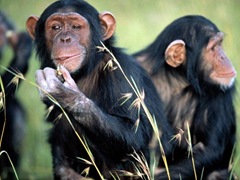Did I just marry an African chief?
 KURUBONLA, Sierra Leone (Reuters) - The chief is gesticulating wildly and I see spit flying out of his mouth.
KURUBONLA, Sierra Leone (Reuters) - The chief is gesticulating wildly and I see spit flying out of his mouth.
I am pretty sure I have offended him but don't understand much of the local Kuranko language, so I ask the man next to me who speaks some English.
"Oh, he's just saying he's made you his wife," he replies. "Nothing to worry about."
I'm still trying to come to terms with accidentally eating monkey last night.
I am not sure what I was expecting when I took a motorbike taxi tour across 320 km (200 miles) of Sierra Leone's eastern back roads.
But marriage and eating monkeys weren't what I had in mind.
I ride behind Ibrahim Koroma, the self-styled "task force" of the Koinadugu Bike Riders' Association, who agreed to rev his Chinese-made machine smuggled from Guinea along village paths, with me hanging on the back.
He says he will minimize the "gallops" for me and drive like I'm his old mother. As the bones in my back clonk against each other I'm glad he doesn't see me as his younger brother.
Apart from our noisy passage, the sense of isolation from the modern world is complete.
There is no phone coverage for days, tall grasses brush my helmet and the area is so remote that there is not even a discarded Coca Cola bottle in sight.
When we reached Kurubonla town, a collection of mud-built homes topped off with thatch or tin, someone was sent to beat a drum to gather everyone to see an unannounced stranger -- me.
Not long afterwards, I seemed to have acquired a husband.
The very least I can do is say thank you and shake his hand. Oh, and ask his name. He takes off his hat and puts on special ceremonial headgear, colored gold with burnt red patches, and we pose for marriage snaps.
Possibly into his 70s, Chief Mamburu Marah looks quite fetching.
Despite his public declaration of our betrothal, I was able to slip away later with a promise to come back and see him soon.
MONKEY BUSINESS
The local chief of Mongo Bendugu, another small town, was less amorous but no less obliging, finding us a place to stay for the night in the school principal's house.
A local policeman was kind too, offering to share his meal. He worried local food might not be suitable, mentioning rice and potato leaf sauce. "Nonsense," I said, and we tucked in.
I took some meat too, since it's a bit of an honor to be offered it. It was the best I've ever had -- rich and tender with not a trace of gristle.
As I chomped, I noticed one of the bones, flat and disc-like, and the question flew out of my mouth.
"Er, what meat is this?"
"Monkey," came the reply.
The policeman, who couldn't stop laughing, tried to make me promise that when I wrote his name down in my notebook, I wouldn't remember him as "the man who made me eat monkey".
He said the monkey was probably shot in neighboring Guinea, slow-roasted and brought over the border.
Civilians are banned from having guns in Sierra Leone following its 1991-2002 civil war. This has annoyed hunters, who have lost their symbol of virility and main income-earning tool.
They have become more inventive, laying bush traps for deer and other animals. But everyone agrees chimpanzees, which are protected under Sierra Leone law and can be five times as strong as a man, are far too clever to fall for such tricks.
The small west African country is home to several more rare primates, including the endangered Diana monkey and red colobus.
But most locals aren't fussy when it comes to supplementing their diet.
"The type of monkey you net in the trap is the type of monkey you kill," was how one local put it. "It's delicious for us and very nice to eat."
I tried to look half-disapproving, but I know by experience he is right.
WITNESS: Did I just marry an African chief? | Reuters Recommends | Reuters.com

